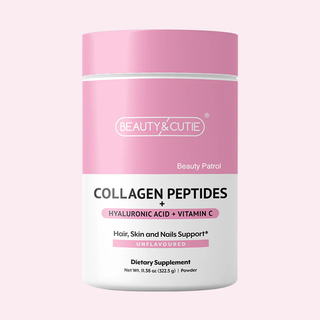Although the terms "dry skin" and "dehydrated skin" are frequently used interchangeably, they actually refer to two distinct skin conditions. Dehydrated skin is a short-term condition that can affect any skin type, whereas dry skin is a type of skin. To choose the best skincare products and treatments, it is essential to understand the differences between dry and dehydrated skin. We'll look at the signs of dry and dehydrated skin in this post, as well as their causes and correct maintenance.
What Is Dry Skin?
Dry skin is a skin type that lacks oil, also known as sebum, which is essential for maintaining moisture and keeping the skin hydrated. Flakiness, itching, and tightness are common in people with dry skin, who frequently have a poor complexion. Both environmental and genetic variables, including chilly temperatures, low humidity, and abrasive skincare products, can contribute to dry skin. Aging and hormonal changes can also worsen dry skin.
What Is Dehydrated Skin?
Dehydrated skin, on the other hand, is a temporary condition that can affect anyone, regardless of skin type. It happens when the skin is dehydrated rather than oily. Weather fluctuations, a bad diet, air conditioning, and even heavy alcohol use can all contribute to dry skin. A tight, flaky, and harsh complexion as well as fine lines and wrinkles are signs of dehydrated skin.
What Are The Differences Between Dry and Dehydrated Skin?
Lack of oil production in the skin is a characteristic of the skin type known as dry skin. Smaller pores, a poor complexion, peeling, and itching are common in people with dry skin. The management of dry skin, which is frequently inherited, requires regular hydration and moisturization.
A transitory condition known as dehydrated skin is brought on by a lack of water in the skin. All skin types, including oily or mixed skin, are susceptible to this. Skin that is dehydrated may be tight, dull, and even have fine lines or wrinkles. Weather variations, food, and lifestyle choices like smoking or drinking alcohol are only a few of the causes.
What Are The Treatments For Dry and Dehydrated Skin?
Fortunately, there are several treatments to combat these skin conditions and restore your skin's natural moisture and suppleness. Here are a few options:
- Hydrating Moisturizers: Using a rich and hydrating moisturizer is a great way to restore moisture to dry and dehydrated skin. Look for moisturizers that contain ingredients like hyaluronic acid, glycerin, or ceramides which help to lock in moisture and promote healthy skin.
- Humidifiers: Adding a humidifier to your living space can help to add moisture to the air, which can in turn help to combat dry skin. A humidifier can also help to soothe dry and irritated sinuses, making it a great choice for the winter months.
- Facial Oils: Facial oils can be a great addition to your skincare routine, especially if you have dry or dehydrated skin. Look for oils that are high in antioxidants like vitamin E or omega-3 fatty acids which can help to protect and nourish the skin.
- Exfoliation: Exfoliation can help to remove dead skin cells and promote cell turnover, which can help to improve the texture and appearance of dry or dehydrated skin. However, it is important to use gentle exfoliants and not over-exfoliate, as this can further damage the skin barrier and lead to more dryness or irritation.
- Masks: Face masks can be a great way to provide a boost of hydration to the skin. Look for masks that contain ingredients like aloe vera, honey, or avocado which have natural hydrating properties. Sheet masks are also a great option as they provide a concentrated dose of hydration to the skin.
- Serums: Serums, specifically hydrating serums, can be a great addition to your skincare routine to improve dry and dehydrated skin. Look for serums that contain hyaluronic acid which can hold up to 1000 times its weight in water, providing intense hydration to the skin. Other ingredients to look for include niacinamide and vitamin B5 which can help to improve the skin's barrier function and retain moisture.
- Cleansers: Choosing the right cleanser is crucial for those with dry or dehydrated skin. Look for cleansers that are gentle and do not strip the skin of its natural oils. Avoid products with harsh or drying ingredients like sulfates and alcohol. Instead, opt for cleansers that contain hydrating ingredients like aloe vera, glycerin, or ceramides.
- Toners: Toners can be a helpful addition to your skincare routine for those with dry or dehydrated skin. Look for toners that contain ingredients like hyaluronic acid, chamomile, or rose water which can help to soothe and hydrate the skin. Avoid toners with alcohol or astringents as they can strip the skin of its natural oils. Toners can also help to restore the skin's pH balance, which can help to improve its overall health and appearance.
What Is The Best Way To Prevent Dry and Dehydrated Skin?
The first thing to remember is to drink lots of water. Drinking at least eight glasses of water a day helps keep your skin feeling and looking wonderful. Staying hydrated is crucial for healthy skin.
Second, make it a point to hydrate your skin frequently. Skin that is dry and dehydrated can result from water loss and moisture loss, which are both prevented by moisturizing. Apply a moisturizer made for your skin type twice a day, once in the morning and once in the evening.
Thirdly, pay attention to the skin-care products you use. Avoid using abrasive cleansers and exfoliants that could strip your skin of its oils and make it even dryer. Be careful when applying alcohol- or fragrance-containing products to your skin because they can also cause drying.
Fourth, shield the elements from your skin. Wear warm clothing in cold weather, and use a humidifier to keep the air moist. When it's hot outside, use sunscreen to shield your skin from the sun's damaging rays and try to find some shade.
Finally, maintain a nutritious diet. Your skin may be nourished from the inside out by eating a healthy, balanced diet that is high in fruits and vegetables.
Are There Any Natural Remedies For Dry and Dehydrated Skin?
Although there are many skincare products on the market that can help with this issue, natural remedies can also be useful in giving your skin relief.
Coconut oil is one of the best natural treatments for dry and parched skin. Coconut oil, which is rich in fatty acids and vitamin E, is a fantastic moisturizer that can help hydrate and nourish the skin. Just dab a little coconut oil on your skin before bed and keep it there all night to let it absorb into your skin.
Honey is another successful natural treatment. Honey can calm and moisturize dry, parched skin because of its antibacterial and anti-inflammatory effects. Just spread some honey thinly over your skin and leave it on there for 20 to 30 minutes before washing it off with warm water.
Another all-natural treatment for dry and parched skin is aloe vera. Aloe vera, which is high in vitamins and antioxidants, helps calm and moisturize the skin to lessen itching and irritation. Your skin should be covered in fresh aloe vera gel, which you should let on for 10 to 15 minutes before washing off with water.
Conclusion
In conclusion, choosing the best skincare regimen for your skin requires an understanding of the differences between dry and dehydrated skin. Dehydrated skin lacks water while dry skin lacks oil. While regular moisturizing and natural remedies like coconut oil, honey, and aloe vera can help soothe and hydrate the skin, smoking, alcohol, and harsh cleansers can all contribute to dry skin. Always use skincare products that are appropriate for your skin type, and if you have recurring skin problems, see a dermatologist. You may attain healthy, glowing skin by following the correct skincare regimen and paying attention to your skin's needs.
Final Thoughts
At Beauty and Cutie, we understand the importance of looking and feeling your best. That’s why we’ve crafted a premium collagen powder to nourish your hair, skin, and nails. Packed with collagen peptides and amino acids, our unique formula promotes cell regeneration and supports optimal growth. Experience healthier, more radiant results—try Beauty and Cutie today and feel fabulous from the inside out!
Sources
- https://www.nivea.co.uk/advice/skin/what-is-sebum
- https://dermatologymohsinstitute.com/how-to-tell-if-your-skin-is-dehydrated
- https://www.everydayhealth.com/healthy-skin/ceramides/guide/
- https://www.goodrx.com/well-being/alternative-treatments/humidifier-benefits-uses
- https://avocadosfrommexico.com/blog/beauty-care/4-ways-avocados-great-skin-hair
- https://www.bbcgoodfood.com/howto/guide/eat-your-way-fabulous-skin
*These statements have not been evaluated by the Food and Drug Administration. This product is not intended to diagnose, treat, cure or prevent any diseases.


